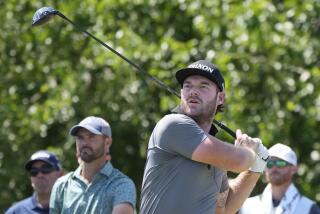3 women give jurors a glimpse into Murray’s personal life
- Share via
One gave birth to his son, another caught his eye in a Las Vegas nightclub and the third flirted with him in a Houston bar. Together the women who took the stand at the trial of Michael Jackson’s personal physician Tuesday gave jurors a glimpse into Conrad Murray as a man, and not as a doctor.
Summoned by prosecutors to verify phone records from the last day of the pop star’s life, the women hinted at a side of Murray that jurors had not previously seen — the married man in his mid-50s pursuing much younger women.
Prosecutors suggested Murray was preoccupied with his love interests when he should have been focused on Jackson, whom he was treating with the powerful anesthetic propofol.
Full coverage: The Conrad Murray trial
On the morning of June 25, 2009, Murray texted a Las Vegas dancer, screened a call from a former girlfriend in Los Angeles and was talking with a Houston waitress when prosecutors say he realized that Jackson had stopped breathing.
“I started telling him about my day, and that’s when I realized he was no longer on the phone,” the waitress, Sade Anding, recalled. “I was just talking, and the next thing, I said ‘Hello, hello,’ and then I didn’t hear anything.”
Later in the back of an ambulance, still insisting Jackson’s life might be saved, Murray phoned a Santa Monica actress with whom he was living and had an infant son.
“I remember him telling me that he was on the way to the hospital in the ambulance with Mr. Jackson and for me not to be alarmed,” Nicole Alvarez said.
Prosecutors wanted jurors to hear a lot more unflattering evidence about Murray’s relationships, suggesting that his wooing of exotic dancers and cocktail waitresses with huge tips and mentions of his connections to Jackson showed a “pattern” of indiscretion.
Superior Court Judge Michael Pastor barred most of that testimony as prejudicial, but Anding, Alvarez and a third woman who testified were permitted to say that they met Murray in bars or clubs and that he pursued them.
“From that first meeting with Conrad Murray, did he give you his telephone number?” Deputy Dist. Atty. Deborah Brazil asked Michelle Bella, the Las Vegas dancer.
“Yes,” she replied.
Responding mostly to yes or no questions, the women did not detail the nature of their relationships with Murray, who has been married for decades to a medical school classmate. Brazil did ask Bella about how freely the doctor discussed his role as Jackson’s personal physician.
“Did he leave that type of information on a voice mail on your cell on June 16, 2009?”
“Yes,” Bella replied.
Alvarez said the doctor had told her as early as 2008 that he was caring for the singer, and even arranged as a surprise for her to meet the singer.
“I was speechless when I met him,” she recalled.
Alvarez told jurors that beginning in April 2009, Murray began spending nights at Jackson’s mansion. She said she never asked what treatment he was providing the singer or opened the many packages Murray received from a Las Vegas pharmacy.
The pharmacist who shipped those packages testified that Murray ordered 255 vials of propofol and other medications in the three months before Jackson’s death.
Tim Lopez, the proprietor of Applied Pharmacy Services, said Murray led him to believe he planned to use the anesthetic at a Los Angeles clinic he owned. In fact, Murray had no practice in California and Jackson was his only patient.
In a day of testimony about Murray’s personal life, there was one bright spot for the defense: a longtime administrative assistant who traded calls with Murray the morning Jackson died. On cross-examination, Stacey Ruggles described the needy patients the doctor cared for at a Houston charity clinic he set up in honor of his late father.
“Most of them were indigent, on fixed incomes, and were unable to afford a physician,” Ruggles said. “From what I could see, there was a very minimal amount of income that came in from that office during that time.”
“Because of the individuals that he chose to see?” Ed Chernoff, an attorney for Murray, asked.
“Yes, sir,” she replied.
Full coverage: The Conrad Murray trial
More to Read
Sign up for Essential California
The most important California stories and recommendations in your inbox every morning.
You may occasionally receive promotional content from the Los Angeles Times.















